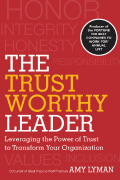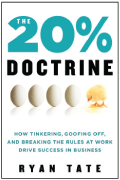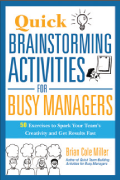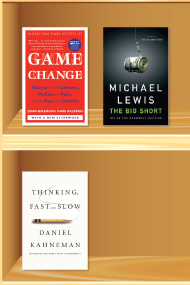TD Magazine Article
Trust Me I am Worthy
A review of The Trustworthy Leader: Leveraging the Power of Trust to Transform Your Organization by Amy Lyman
Mon May 07 2012
The Trustworthy Leader: Leveraging the Power of Trust to Transform Your Organization

By Amy Lyman
(Jossey-Bass, $27.95, 224 pp.)
What is refreshing about Lyman's insights on trust is that the leaders she profiles come from great companies. How does she know they are great?
The evidence is in her observation and learning as co-founder of the Great Place to Work Institute, widely known for its Best Companies to Work For rankings in Fortune magazine.
Lyman has tapped her qualitative database to provide insight on trustworthy leadership from some of the highest rated and best-performing companies in the United States. She provides compelling examples from interviews with leaders and employees across countless industries to support the notion that the best companies have trustworthy leaders at the helm and consistently trustworthy leadership throughout the ranks.
Lyman explains that trustworthy leaders cultivate a shared sense of purpose for all employees through six key behaviors: acting with honor, including employees, engaging followers, sharing information, developing people, and moving through uncertainty to pursue opportunities. She cites poignant examples of great leaders at General Mills, REI, Mayo Clinic, Wegmans, and more "great place to work" companies.
In addition to humility, such leaders exude reciprocity—genuine care and respect for the people with whom they work—and position awareness, or self-awareness of one's network and personal power, which is cultivated through reciprocity. They include and engage employees through choice, accompaniment, and connection. They proactively and openly give ideas to promote understanding so that information sharing is approached from the recipient's point of view, with the purpose of enhancing participation and extending influence to others.
Managers and leaders at all levels can gain new insights from Lyman's qualitative research. Leaders would benefit from reading even one chapter and, by embracing the ideas, could increase their trustworthiness significantly. However, for an organization to achieve the status of a great place to work, it may need to transform its leadership style and behavior as a whole.
Destructive behaviors that are incompatible with trustworthy leadership are politicking, territoriality, withholding information, and using coercive and illegitimate power, among others. A company's culture—whether one of trust or fear—sheds light on its leadership. The leadership team is responsible for the culture it creates or fails to change.
Lyman proves that employees with trustworthy leaders feel valued and included and unanimously recognize that trustworthiness is something truly special in a leader.
The 20% Doctrine: How Tinkering, Goofing Off, and Breaking the Rules at Work Drive Success in Business

Ryan Tate
(HarperBusiness, $25.99, 208 pp.)
The 20% Doctrine is about how "goofing off" at work can drive innovation and profit. Tate examines the origins and implementation of 20 percent time at Google, where executives encourage workers to use 20 percent of their time for personal activities—or goofing off—to fuel innovation. He also describes similar practices at other organizations such as Flick and The Huffington Post, and their intentional as well as unintentional adaptations of the 20 percent doctrine. Tate applies common themes and teachings that can help workers to initiate successful 20 percent-style projects within their own organizations.
Being Global: How to Think, Act, and Lead in a Transformed World

Angel Cabrera and Gregory Unruh
(Harvard Business Review Press, $30, 224 pp.)
While globalization within the world's economy always has been discussed, academics have yet to fully address the ways in which leadership changes in a global context. To be a global leader you must "master the complex mindset and competencies that exist today," write Cabrera and Unruh. They inspect and provide answers to problems that will help the entire organization in a global context: How can you be effective? What new skills must you learn to be effective? How do you stay connected while still producing results on a regional scale? Being Global is a book for those who want to rise above global differences, and learn how to not only think but act globally.
Quick Brainstorming Activities for Busy Managers: 50 Exercises to Spark Your Team's Creativity and Get Results Fast

Brian Cole Miller
(AMACOM, $18.95, 194 pp.)
This book provides supervisors, managers, and team leaders with interesting and proven activities to get productive brainstorming sessions started and keep them going. Readers are introduced to many exercises such as grid creation and mind mapping. Throughout the book readers will learn to focus on quality not quantity; withhold evaluation; encourage wild, outlandish ideas; and combine or build on ideas from others.
What's on Jim Clifton's Bookshelf?

Game Change: Obama and the Clintons, McCain and Palin, and the Race of a Lifetime by John Heilemann and Mark Halperin. I can't get enough of the behind-the-scenes details of presidential campaigns, and I trust these two authors.
The Big Short: Inside the Doomsday Machine by Michael Lewis. The subprime mess is something that continues to haunt me because it is so unbelievable to me how it took so many people to be in on the whole thing to make it work. From Congress having a will to get people homes that they could barely (or couldn't) afford to then loosening the shoelaces on Fannie and Freddie; banks and savings and loans companies jumping in with reckless loans; the ratings agencies missing the barn; and then finally the consumer accepting the loans that never should have been offered to them. And just a few people in the whole world saw this coming.
Thinking, Fast and Slow by Daniel Kahneman. I have read almost everything written by Kahneman because I believe he is the godfather or the Gandhi of behavioral economics (BE). I am sure that leaders in most walks of life will adopt new BE systems just as surely as they did very successfully Six Sigma, Lean Thinking, TQM, and all process-improvement sciences. BE is the next Six Sigma, and this book is the new text for it.
